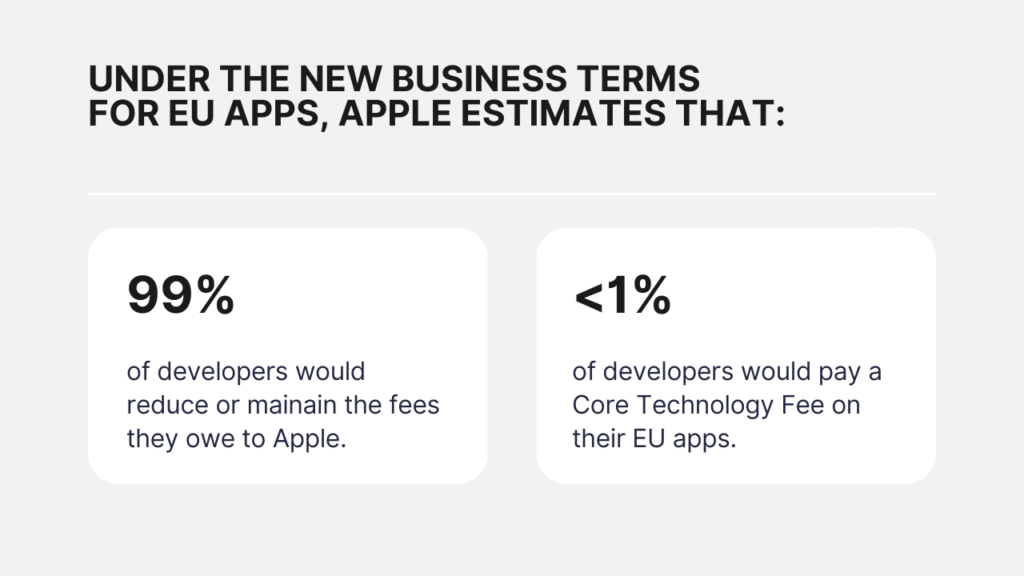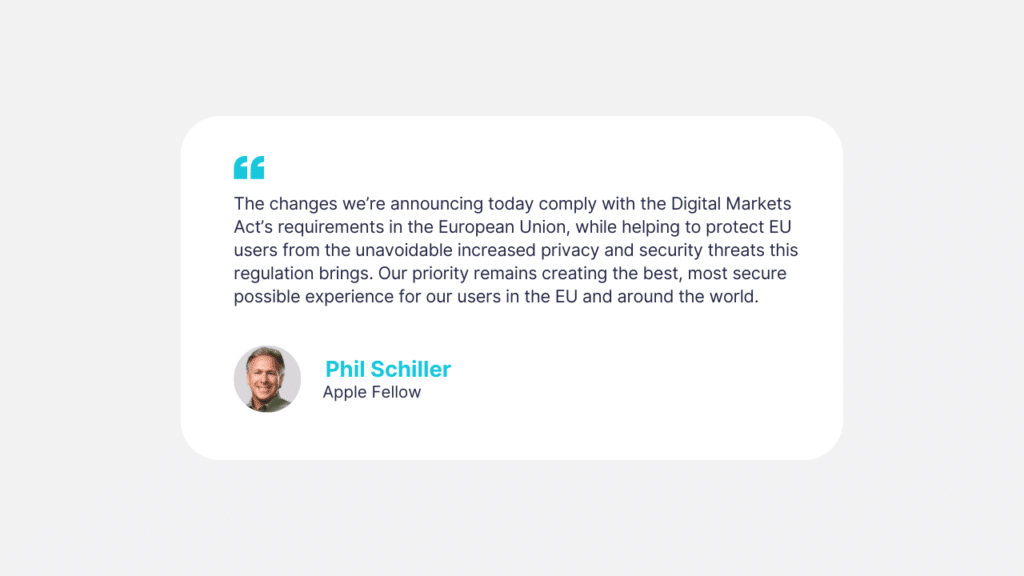Monthly Tech Digest: How Major Companies Prepare for Regulatory Changes in Europe
In the next few minutes, we’ll unravel the latest stories in the tech realm, from how companies get ready for regulatory changes in Europe to the hottest updates on the Apple Vision Pro and the unveiling of a much promising new device. Let’s get started!
Apple and its DMA drama
Apple commits to complying with the DMA
In September, the EU designated Apple as a “gatekeeper” under the Digital Markets Act (DMA), and now Apple is introducing changes to comply, including a new fee called the “Core Technology Fee.” This fee allows Apple to retain a cut even when developers distribute apps through alternative app stores. Other changes include reductions in the App Store commission on digital purchases and adjustments to European business terms. Apple emphasizes the need for these changes to support DMA requirements. The company also addresses potential security risks associated with opening up iOS apps to install other apps, warning of increased malware risks.

Spotify criticizes Apple: “Extortion” and “Farce”
Interestingly, Spotify has strongly criticized Apple’s compliance plan with the EU’s DMA, calling it “extortion” and a “complete and total farce.” Spotify CEO Daniel Ek expressed dissatisfaction with Apple’s new fees, particularly the “core technology fee” and the 3% payment processing fee, deeming them as attempts to maintain control and hinder alternative distribution methods.
Ek argued that these fees would significantly impact larger apps with millions of EU users, potentially raising customer acquisition costs for Spotify. He urged lawmakers to recognize Apple’s actions and called on them not to let their regulatory efforts fail. Spotify’s criticism follows similar condemnation from Epic Games and the Coalition for App Fairness. Apple responded, highlighting its support for all developers and emphasizing the choices in its new terms for apps in the EU.

Opera seizes opportunity with new AI browser for iOS after Apple’s compliance changes
Meanwhile, Opera doesn’t waste its time and has announced plans to launch a new AI-powered browser for iOS in Europe, taking advantage of Apple’s compliance with the European DMA that allows alternative browser engines. Apple will now permit developers to submit non-WebKit-based browsers, providing an opportunity for Opera to deliver an AI-centric alternative to Safari. The move aligns with DMA’s goal of fostering competition and offering users diverse browser choices on iOS. Opera anticipates the browser, named Opera One for iOS, to debut in March, coinciding with the DMA’s implementation in the European Union. The company encourages Apple to extend these changes globally.
Meta embraces EU regulations, too
In September, the European Union designated Meta, just like Apple, as a “gatekeeper” under the Digital Markets Act, listing six of its products, including Facebook, Instagram, WhatsApp, Facebook Messenger, its ads delivery system, and its virtual marketplace platform, Marketplace, as “core platform services” subject to DMA regulations.
The deadline for Meta and other designated gatekeepers to comply with the DMA is March 7, 2024. In response, Meta is working on adjustments to its services to align with the regulations. Notably, Meta plans to offer users more choices regarding how they use its services in the European Union. These choices include the ability to block Meta from combining data related to their use of Facebook and Instagram.
However, critics argue that Meta’s design of choices may manipulate users into accepting data combinations, potentially violating DMA and GDPR standards. The DMA explicitly requires gatekeepers not to deceive, manipulate, or distort users’ ability to give consent. EU privacy advocates closely monitor Meta’s compliance, as violations could result in substantial fines of up to 10% of global annual turnover.
It’s worth noting that the DMA also obliges gatekeepers to ensure that consent withdrawal is as easy as giving consent, providing an additional layer of scrutiny to Meta’s choices. The European Commission, overseeing DMA compliance, can crack down on practices that breach the regulations. The pace and tone of enforcement will be set by the Commission, making Meta’s approach a potential indicator for other tech giants subject to DMA regulations.
How does Google prepare for DMA implementation in the EU?
In anticipation of the DMA, Google has begun testing and rolling out changes to its products. Google’s preparations include:
- Introducing additional consents for linked services.
- Altering Search results.
- Implementing choice screens for Android users.
- Testing a Data Portability API for developers.
While supporting the DMA’s ambitions, Google has raised concerns about potential limitations on choices for users and businesses. More details on final changes will be revealed before the March deadline.
Layoffs in 2024: Seriously, again?
After a year of massive job cuts in tech, 2024 has barely started, and we’re already witnessing layoffs. The employment challenges in the industry seem to be continuing.
- Riot Games: The gaming giant is playing a tough round, announcing the layoff of about 530 employees, constituting 11% of its workforce.
- Brex: Once valued at $12.3 billion, the expense management startup faces a credit decline and has laid off 282 people, approximately 20% of its staff.
- Vroom: The online used car marketplace is hitting the brakes, shutting down, and letting go of 800 employees, which accounts for 90% of its workforce.
- Microsoft: Microsoft is cutting 1,900 gaming division jobs (it is about 8.6% of the workforce) after the $68.7 billion Activision Blizzard acquisition, part of industry-wide layoffs in 2024, with support pledged for affected employees.
- Amazon: Amazon confirms layoffs in its Buy with Prime unit, impacting 30 employees or fewer than 5% of staff, as part of broader job cuts across the company, offering affected workers at least 60 days of pay and benefits along with support for finding new positions within Amazon.
- eBay: eBay announces plans to cut 1,000 jobs, constituting around 9% of its workforce, citing stagnant growth and economic challenges.
- YouTube: YouTube, part of Google, is set to cut 100 employees as part of organizational changes, aligning resources to major product priorities, amid broader layoffs across various tech companies in the early weeks of 2024.
What’s going on with Apple Vision Pro?
The Apple Vision Pro will be available for purchase starting February 2 at a price of $3,500
The Apple Vision Pro is set to hit the market on February 2, available for purchase at $3,500. Apple officially confirmed its U.S. release date and has already started preorders on January 19 at the same price. The launch introduces the Vision Pro App Store, boasting over 1 million compatible iOS and iPadOS apps, as well as tailor-made experiences for the headset. Additional features include a FaceTime experience designed for the hardware, ZEISS Optical Inserts, and a new operating system called VisionOS, featuring a 3-dimensional user interface controlled by eyes, hands, and voice. Read more about the influence of market demand for AR/VR headsets on the Metaverse and spatial computing in our latest article.
Netflix and YouTube will not launch a dedicated app for Apple Vision Pro
However, some major streaming platforms like YouTube and Netflix have opted not to release dedicated apps for the Apple Vision Pro launch. Instead, users will need to access content through web browsers. While YouTube hasn’t disclosed its reasons, this decision disappoints customers who won’t have access to YouTube’s offline downloads feature on the headset.
Several other companies, including Meta-owned platforms like Instagram, Facebook, Threads, and WhatsApp, as well as Spotify, Snapchat, DoorDash, Bumble, Lyft, and others, are reportedly hesitant to launch compatible apps for the Vision Pro. This reluctance is attributed to recent updates in Apple’s App Store rules, including a 27% fee for out-of-app-store purchases. Nevertheless, nearly 20 other apps are set to provide entertainment experiences on the headset, including TikTok, Disney+, Max, Discovery+, Amazon Prime Video, Paramount+, and IMAX.
A new player in the game? Meet Rabbit r1
Seems like we’ve got a new player in the game, Jesse Lyu with Rabbit R1 – a unique pocket AI device designed to simplify everyday tasks without using a phone. Priced at $200, it allows users to perform various functions, such as ordering a ride, finding restaurants, or searching for lodging.

What’s the difference from the phone then? Well, you give orders through natural language commands.
Unlike traditional voice assistants, the r1 uses a “large action model” trained on screenshots and videos of standard apps, offering a more versatile approach. It is designed to work with various apps and services, and users can teach it to interact with new apps by demonstrating usage. The device aims to provide a hands-free and efficient alternative to using a smartphone for specific tasks. The rabbit r1 features a distinctive design and was created by Teenage Engineering. Despite potential competition from tech giants, the startup behind the Rabbit r1 emphasizes agility and a unique user experience.





